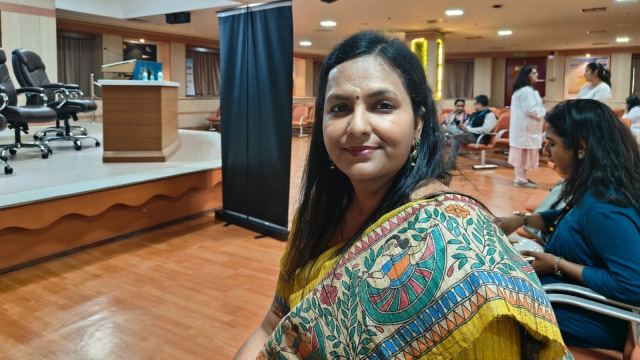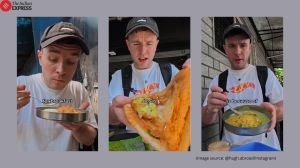‘I had to live…’: How an ISRO scientist beat breast cancer to work on Chandrayaan-3 mission
Her very human telling of the psychological impacts of not just losing a breast to mastectomy but also her most prized possession – her hair – resonates with the stories of many survivors.
 Rinku Agrawal, Breast Cancer Survivor and SAC (ISRO) Scientist
Rinku Agrawal, Breast Cancer Survivor and SAC (ISRO) ScientistBreast cancer survivor Rinku Agrawal wasn’t as scared of chemotherapy as she was about losing her hair. And cancer didn’t stop Agarwal from her professional pursuits. Since her recovery, she has worked on the hardware side of India’s most prestigious missions such as Chandrayaan-3, Earth Observation Satellites and NISAR. She has also become a TEDx speaker and a vociferous advocate for breast cancer awareness.
“Losing hair was a touchy subject for me. I’ve loved my long hair since I was a little girl. They are the best part of me. And when the time came, I only cut them short. I was not scared of chemotherapy as much as I was of losing my hair,” said Agrawal, Senior Scientist/Engineer and Head of Department at the Space Application Centre, ISRO, Ahmedabad.
Speaking to The Indian Express on the sidelines of an event on early breast cancer diagnosis at Apollo Hospitals, 50-year-old Agarwal, who is mother to twin boys, said, “When I realised I had breast cancer, the first question I asked my ISRO doctor was whether I have have to undergo chemotherapy because I knew that would lead to hair loss. When my hair began to shed due to chemo, I didn’t let our house help sweep it away, I used to pick them up and dispose of them by hand.”
Her very human telling of the psychological impacts of not just losing a breast to mastectomy but also her most prized possession – her hair – resonates with the stories of many survivors. Some of the advocates for breast cancer awareness plead with women to conduct self breast examinations routinely and seek medical opinion because more than 50-60% patients in India reach doctors only when it is too late.
Speaking on her diagnosis, Agrawal said, “I had undergone several rounds of hormone therapy for three years and then gave birth to twin boys, through In-vitro Fertilisation (IVF) in 2007. Then, in June 2013, when the boys were about six-years-old, I received a setback at work. And at the same time, I began feeling my right side getting heavy and my hand would pain when raised. But I thought it was because the children were sleeping on my hands. But I did go to see our in-house ISRO doctors who recommended mammography and sonography. So, I came to Apollo Hospital where an acquaintance of mine was already under treatment.”
She added, “A couple of days later, my son was sick so I took him to the doctor and then went to work. My doctor called me and asked me to meet Dr Anagha Zope where I was told I had breast cancer. My family was counselled and my treatment began.”
At that time, Agrawal hadn’t realised the full scope of what she would have to undergo. “But I had made up my mind that I had to live and get better for my kids.”
Dr Anagha Zope, Lead Consultant, Breast and Oncoplastic Surgeon at Ahmedabad’s Apollo Cancer Centres said, “Breast cancer is the most prevalent cancer in India accounting for 13.6% of all cancers in India. In Gujarat, we recorded 11,500 breast cancer cases in 2023 which amounts to 32 new cases per day and we lost 4,280 people in 2023, which is 12 deaths per day of women due to breast cancer in Gujarat.”
Agrawal said when the treatment began, she was in a bad mood, lashed out at people and was in extreme physical discomfort. However, the first major point in her treatment would come in October 2013. She said, “I had four chemotherapy sessions and in October 2013 went for mastectomy and my right breast was removed.”
“When the mastectomy took place, I was given an option to have breast reconstruction surgery but I didn’t want to go through more treatment at that time. I had already undergone so much treatment and I couldn’t take more of it. My husband and I consulted on the issue and decided we didn’t need to go for it. So, I use a prosthetic and now it doesn’t make that much of a difference. But this is a very personal choice. And I think that if this had happened today, I would have perhaps opted for it because of development in the field.”
Striking a comparison between breast reconstruction and breast saving surgery, Dr Zope said, “We have procedures where patients can use their own body part tissues to reconstruct the breasts or use medical silicone. It is easy to tell someone to remove the breast but for the woman, it is an integral part of her identity. It’s not just what others see but what she sees herself as. Saving a breast is every woman’s right. We can also do breast saving surgeries where we can do so but that requires additional radiation therapy and costs also increase. The end result is the same in both procedures but the only thing in reconstruction is that the part of the breast that could cause more cancer, has been removed completely.”
After the mastectomy, Agrawal said she received vital support at work. “In January 2014, my seniors told me I should go to the office and work to take my mind off all this treatment. At that time I was designing the hardware of a miniaturised subsystem for the NASA-ISRO Synthetic Aperture Radar (NISAR) mission. While this work was on, radiation dates came up so I used to go for radiation for two hours and then returned to the office.”
On the psychological impact of the cancer treatment on her work, Agrawal said, “My colleagues were very helpful and encouraging but since I was undergoing treatment, I thought I was down, I thought what work could I do now?”
The majority of the treatment was completed by March 2014. But the first two years were critical and five years were crucial, where a lot of care had to be taken to reduce the scope of relapse.
Speaking on the Check-Olate awareness campaign, a statement quoted her as saying, “Check-Olate is our way of turning a moment of indulgence into a reminder for proactive health. Dark chocolate, known for its antioxidant and mood-enhancing benefits, becomes a comforting messenger of care, reminding every woman that a simple self-examination, just a few minutes a month, can make all the difference. By making this message accessible and relatable, we aim to replace fear with awareness and action.”
In 2015, as Agrawal was recovering from her treatment, her work too saw an upturn and she was made a project manager with a team working on the components of the Earth Observation Satellite (EOS) Series. “This prestigious work gave me confidence, hope and encouragement to work harder. But on the side, there were constant check ups and I had to undergo another gynaecological procedure,” she said.
Even after the treatment, Agrawal said she had a kind of fear that there would be a relapse and she could lose her life. She found peace in a Buddhist community and began chanting as well as yoga to help with the lingering anxiety.
“There was also a lack of confidence in the work I had done during treatment and that lingering fear of whether everything had been done right or not. However, things got even better because I got the opportunity to work on the Vikram Lander which went to the Moon on the Chandrayaan-3 Mission. That also gave me satisfaction that life would go on and I wouldn’t be hindered by what I had gone through with the treatments. And on the personal front, both my kids have grown up and one is in Engineering and the other in the medical field,” said Agrawal, adding that the experience had made her stronger.
According to her, the experience has only made her stronger. “Today, I’m the head of my division and I have much more work left to do,” she said.







